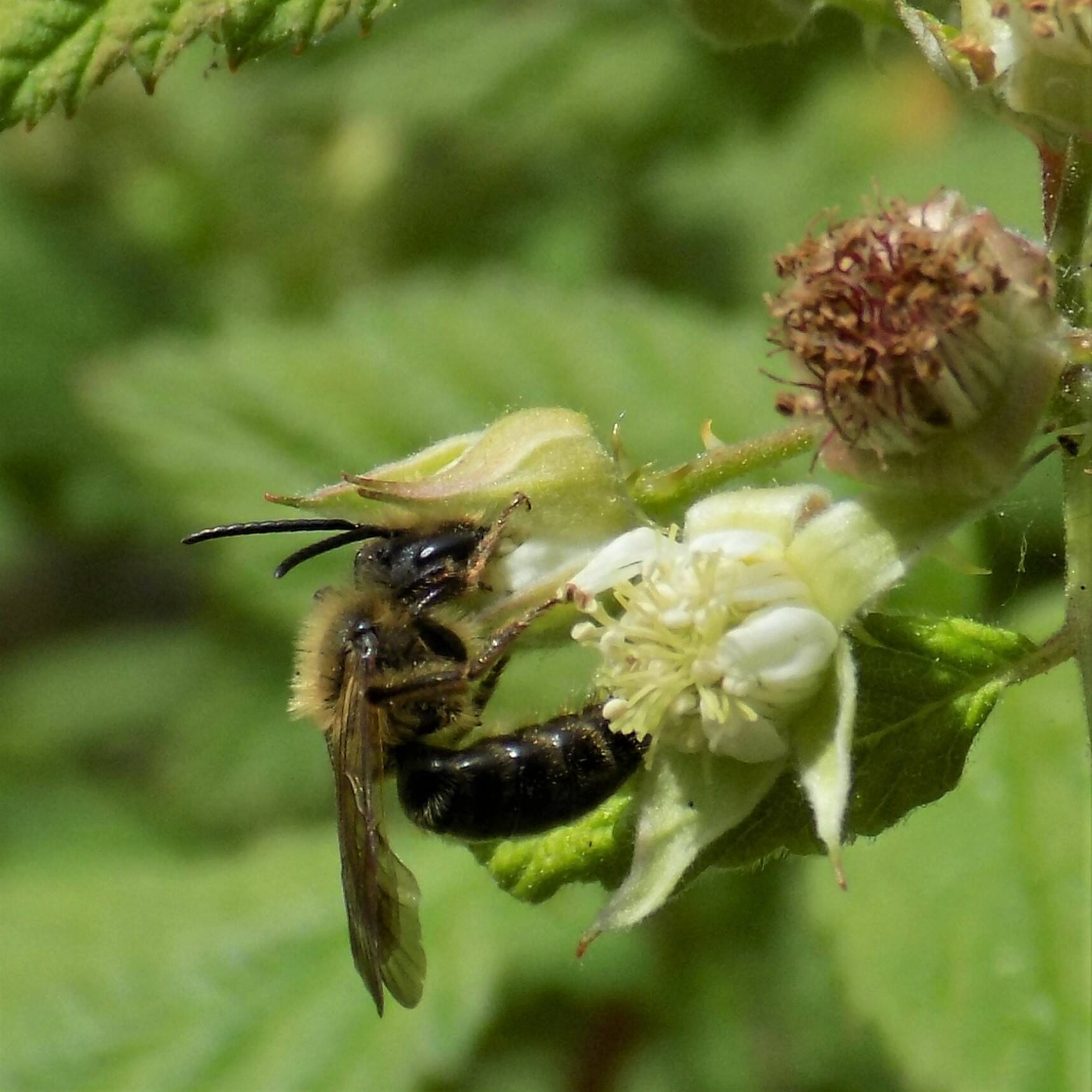by Russel Barsh
Kwiaht
Have pollinators been disappearing? Well, like so much in science and nature, it’s complicated. Kwiaht biologists have been studying pollinators in the islands’ natural areas for more than a decade: long enough to notice significant changes in plant-pollinator relationships.
The islands are home to about 200 species of wild native bees, ranging from large fuzzy bumblebees and lookalike “digger bees”, to the black-and-white banded “miner bees” that are often mistaken for hornets, and tiny black ant-like carpenter bees. Apart from bumblebees, our native bees are “solitary”: each female prepares and provisions her own nest—frequently just a small underground tunnel lined with something to keep it dry in winter.
The other important group of wild pollinators in the islands are the hoverflies or “flower flies”, which camouflage themselves by mimicking wasps or bees—although they cannot bite or sting. Flies visit flowers to drink nectar and leave with a dusting of pollen on their heads. Many hoverflies live for weeks, migrating and laying eggs along the way; their larvae feast on aphids. There are over a hundred hoverfly species in the islands, including some accidentally introduced European species. Then there are domestic farm-and-garden bees: honeybees, originally introduced from Europe, and some species of mason bees and bumblebees that are marketed internationally as pollinators for farms and gardens. We have seen an increase of domestic bees in the islands’ natural areas since 2010 and a decline in the diversity and abundance of wild native bees. We have also seen flies grow more important for early season pollination. Several factors are probably involved.
Wild native bees are profoundly affected by changing weather patterns. Extremely wet, stormy spring weather damages nests, delays the emergence of young bees, and changes when flowers bloom so that many bees emerge too late for the pollen they need to feed their larvae. Flies are earlier-emerging, stronger fliers and do not have nests to provision. Honeybees have a different kind of advantage: they are housed and fed by humans over winter, and emerge early.
This year the islands experienced an unusually stormy, wet spring. Early-flowering fruits such as cherries were mainly pollinated (if at all) by flies. Native wildflowers also bloomed while the weather was wet and windy. Many did well, nonetheless, because, in relatively undisturbed natural meadows, native bees dig their nests among the patches of plants they need for pollen. Plants pollinated at a distance did more poorly.
Bumblebees emerged late this year, and while they are the islands’ farthest-flying and most efficient wild pollinators, highly adaptable to gardens as well as native wildflowers, they missed out on many early-flowering plant species, which will impact their abundance.
A growing number of islanders are purchasing honeybees or mason bees, but this does not substitute for a healthy wild native bee community. Honeybees aggressively compete with wild bees for pollen and require care and winter feeding. There are already over 20 species of native mason bees in the islands that can be protected and fostered, instead of importing bees that will compete with them. Importing bees risks introducing mites and viruses that spread to wild bee populations, moreover. There is a better solution. Nesting habitat is critical for wild bees, and most gardens are designed in ways that exclude bee nests and rely on fly-in rather than resident pollinators
Want to learn more? Help the island conservation laboratory Kwiaht expand its “bats and bees” technical assistance program for homeowners, gardeners, and farmers! Kwiaht is raising money through the San Juan Island Community Foundation’s 2022 County Fair Giving Campaign, which will match the first $1,000 in donations dollar-for-dollar. To be eligible, donations must be made during the 2022 County Fair, August 17–20. Donations can be made in person at the SJICF booth at the Fair; online at www.sjicf.org/fair; by phone at 360-378-1001; or by mailing a check payable to SJICF (and dated between August 17–20) with KWIAHT in the memo line to P.O. Box 1352, Friday Harbor, WA 98250.



